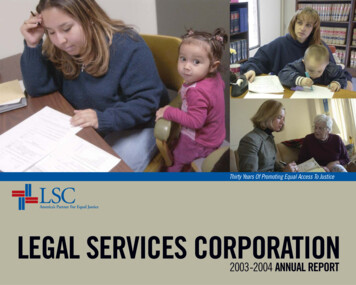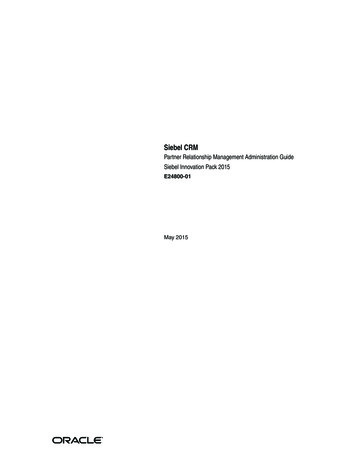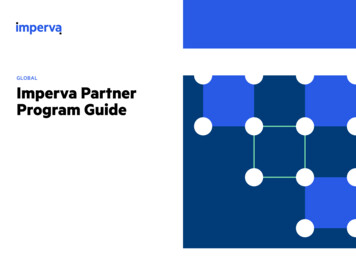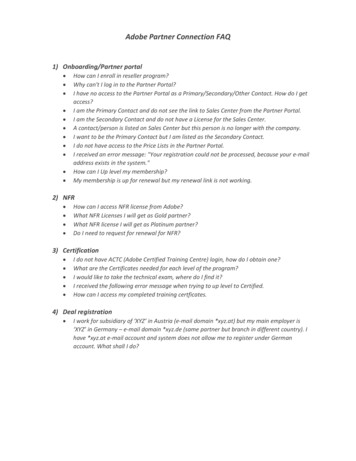
Transcription
Thirty Years Of Promoting Equal Access To JusticeAmerica’s Partner For Equal JusticeLEGAL SERVICES CORPORATION2003-2004 ANNUAL REPORT
Legal Services Corporation 2003-2004 Annual ReportBoard of DirectorsLSC GranteesFrank B. Strickland, ChairmanLillian R. BeVier, Vice ChairmanRobert J. DieterThomas A. FuentesHerbert S. GartenDavid HallMichael D. McKayThomas R. MeitesMaria L. MercadoFlorentino SubiaErnestine P. WatlingtonAcadiana Legal Service CorporationAlaska Legal Services CorporationAnishinabe Legal ServicesAppalachian Research and DefenseFund of KentuckyAtlanta Legal Aid SocietyBay Area Legal AidBay Area Legal ServicesBlue Ridge Legal ServicesCalifornia Indian Legal ServicesCalifornia Rural Legal AssistanceCapital Area Legal Services CorporationCenter for Arkansas Legal ServicesCentral California Legal ServicesCentral Jersey Legal ServicesCentral Minnesota Legal ServicesCentral Virginia Legal Aid SocietyCoast to Coast Legal Aid of South FloridaColorado Legal ServicesCommunity Law OfficeCommunity Legal Aid ServicesCommunity Legal Services of Mid-FloridaCommunity Legal ServicesDakota Plains Legal ServicesDNA-Peoples Legal ServicesEast River Legal ServicesEssex-Newark Legal Services ProjectFlorida Rural Legal ServicesGeorgia Legal Services ProgramGreater Bakersfield Legal AssistanceGuam Legal Services CorporationIdaho Legal Aid ServicesIndiana Legal ServicesInland Counties Legal ServicesIowa Legal AidJudicare of Anoka CountyKansas Legal ServicesKentucky Legal AidLand of Lincoln Legal Assistance FoundationLane County Legal Aid ServiceLaurel Legal ServicesLegal Action of WisconsinLegal Advice & Referral CenterLegal Aid and Defender AssociationLegal Aid BureauLegal Aid Foundation of Los AngelesLegal Aid of ArkansasLegal Aid of East TennesseeLegal Aid of North CarolinaManagementHelaine M. Barnett, PresidentVictor M. Fortuno, Vice President forLegal Affairs, General Counsel, andCorporate SecretaryJohn C. Eidleman, Acting Vice President forCompliance and AdministrationDavid L. Richardson, Treasurer & ComptrollerDanilo A. Cardona, Director of Complianceand EnforcementAlice Dickerson, Director of Human ResourcesMichael A. Genz, Director of ProgramPerformanceJohn C. Meyer, Director of InformationManagementJeff Morningstar, Director of InformationTechnologyOffice of Inspector GeneralRichard K. West, Inspector GeneralDavid C. Maddox, Assistant InspectorGeneral for Resource ManagementLaurie Tarantowicz, Assistant InspectorGeneral and Legal CounselAmerica’s Partner For Equal JusticeLegal Aid of NorthWest TexasLegal Aid of Southeastern PennsylvaniaLegal Aid of the Blue GrassLegal Aid of West VirginiaLegal Aid of Western MissouriLegal Aid of Western New YorkLegal Aid of Western OhioLegal Aid Service of Northeastern MinnesotaLegal Aid Services of OklahomaLegal Aid Services of OregonLegal Aid SocietyLegal Aid Society of Eastern VirginiaLegal Aid Society of Greater CincinnatiLegal Aid Society of HawaiiLegal Aid Society of Middle Tennesseeand the CumberlandsLegal Aid Society of Mid-New YorkLegal Aid Society of Northeastern New YorkLegal Aid Society of Orange CountyLegal Aid Society of San DiegoLegal Assistance Foundation ofMetropolitan ChicagoLegal Services AlabamaLegal Services Corporation of DelawareLegal Services of Cape, Plymouth and IslandsLegal Services for New York CityLegal Services Law Line of VermontLegal Services of Eastern MichiganLegal Services of Eastern MissouriLegal Services of Greater MiamiLegal Services of North DakotaLegal Services of North FloridaLegal Services of North LouisianaLegal Services of Northern CaliforniaLegal Services of Northern MichiganLegal Services of Northwest JerseyLegal Services of Northwest Minnesota CorporationLegal Services of South Central MichiganLegal Services of Southern MissouriLegal Services of The Hudson ValleyLegal Services of the Virgin IslandsLone Star Legal AidMarion-Polk Legal Aid ServiceMassachusetts Justice ProjectMemphis Area Legal ServicesMerrimack Valley Legal ServicesMichigan Indian Legal ServicesMicronesian Legal ServicesMid-Missouri Legal Services CorporationMidPenn Legal ServicesMississippi Center for Legal ServicesMontana Legal Services AssociationNassau/Suffolk Law Services CommitteeNative Hawaiian Legal CorporationNebraska Legal ServicesNeighborhood Legal Services AssociationNeighborhood Legal Services ofLos Angeles CountyNeighborhood Legal Services Programof the District of ColumbiaNeighborhood Legal ServicesNevada Legal ServicesNew Center for Legal AdvocacyNew Mexico Legal AidNorth Mississippi Rural Legal ServicesNorth Penn Legal ServicesNortheast New Jersey Legal Services CorporationNorthwest Justice ProjectNorthwestern Legal ServicesOcean-Monmouth Legal ServicesOhio State Legal ServicesOklahoma Indian Legal ServicesPhiladelphia Legal Assistance CenterPine Tree Legal AssistancePotomac Legal Aid SocietyPrairie State Legal ServicesPuerto Rico Legal ServicesRhode Island Legal ServicesSouth Jersey Legal ServicesSouth Middlesex Legal ServicesSoutheast Louisiana Legal Services CorporationSouthern Arizona Legal AidSouthern Minnesota Regional Legal ServicesSouthwest Virginia Legal Aid SocietySouthwestern Pennsylvania Legal ServicesStatewide Legal Services of ConnecticutTexas RioGrande Legal AidThe Legal Aid Society of ClevelandThe Legal Aid Society of ColumbusThe South Carolina Centers for Equal JusticeThree Rivers Legal ServicesUtah Legal ServicesUunai Legal Services ClinicVirginia Legal Aid SocietyVolunteer Lawyers Project of theBoston Bar AssociationWest Tennessee Legal ServicesWestern Michigan Legal ServicesWisconsin JudicareWyoming Legal Services
LSC’s Mission is to provide equal access to the system of justice in our Nation for individuals who seek redress of grievances to provide high quality legal assistance to those who would be otherwise unable to afford adequate legal counsel to assist in improving opportunities for low-income personsThe Legal Services Corporation ActAs Amended, 42 U.S.C. §2996 et seqLEGAL SERVICES CORPORATION2003-2004 ANNUAL REPORTLegal Services Corporation 2003-2004 Annual ReportContents LSC Historical Photos . . . . . . . . . . . . . . . . . . . . . . . . . . . . . . . . . . . . . . . . . . . . . . . . . . . . . . . . . . . . . . . . . . . . . . . . . . . . . . . . . . . 2Introduction . . . . . . . . . . . . . . . . . . . . . . . . . . . . . . . . . . . . . . . . . . . . . . . . . . . . . . . . . . . . . . . . . . . . . . . . . . . . . . . . . . . . . . . . . . . . . 5Message From The President . . . . . . . . . . . . . . . . . . . . . . . . . . . . . . . . . . . . . . . . . . . . . . . . . . . . . . . . . . . . . . . . . . . . . . . . . . . . . 6Commitment To Client Service . . . . . . . . . . . . . . . . . . . . . . . . . . . . . . . . . . . . . . . . . . . . . . . . . . . . . . . . . . . . . . . . . . . . . . . . . . . . . . 7Rendering Vital Aid . . . . . . . . . . . . . . . . . . . . . . . . . . . . . . . . . . . . . . . . . . . . . . . . . . . . . . . . . . . . . . . . . . . . . . . . . . . . . . . . . . . . . . . 8Ensuring High-Quality Service . . . . . . . . . . . . . . . . . . . . . . . . . . . . . . . . . . . . . . . . . . . . . . . . . . . . . . . . . . . . . . . . . . . . . . . . . . . . . 9Encouraging Innovation . . . . . . . . . . . . . . . . . . . . . . . . . . . . . . . . . . . . . . . . . . . . . . . . . . . . . . . . . . . . . . . . . . . . . . . . . . . . . . . . . 10Championing Diversity . . . . . . . . . . . . . . . . . . . . . . . . . . . . . . . . . . . . . . . . . . . . . . . . . . . . . . . . . . . . . . . . . . . . . . . . . . . . . . . . . . 12Nurturing Support For Our Mission . . . . . . . . . . . . . . . . . . . . . . . . . . . . . . . . . . . . . . . . . . . . . . . . . . . . . . . . . . . . . . . . . . . . . . . . 15Progress in Washington . . . . . . . . . . . . . . . . . . . . . . . . . . . . . . . . . . . . . . . . . . . . . . . . . . . . . . . . . . . . . . . . . . . . . . . . . . . . . . . . . 16States Help Fill The Void . . . . . . . . . . . . . . . . . . . . . . . . . . . . . . . . . . . . . . . . . . . . . . . . . . . . . . . . . . . . . . . . . . . . . . . . . . . . . . . 18Attracting Leaders Of Tomorrow . . . . . . . . . . . . . . . . . . . . . . . . . . . . . . . . . . . . . . . . . . . . . . . . . . . . . . . . . . . . . . . . . . . . . . . . . 20Complying With The Law . . . . . . . . . . . . . . . . . . . . . . . . . . . . . . . . . . . . . . . . . . . . . . . . . . . . . . . . . . . . . . . . . . . . . . . . . . . . . . . 22Open House (pictorial) . . . . . . . . . . . . . . . . . . . . . . . . . . . . . . . . . . . . . . . . . . . . . . . . . . . . . . . . . . . . . . . . . . . . . . . . . . . . . . . . . . 24Presidents (pictorial) . . . . . . . . . . . . . . . . . . . . . . . . . . . . . . . . . . . . . . . . . . . . . . . . . . . . . . . . . . . . . . . . . . . . . . . . . . . . . . . . . . . 26Financial Statements . . . . . . . . . . . . . . . . . . . . . . . . . . . . . . . . . . . . . . . . . . . . . . . . . . . . . . . . . . . . . . . . . . . . . . . . . . . . . . . . . . . 27
Committed To ClientsOne thing that has remained constant throughout LSC’s 30 years ofexistence has been an unyielding focus on providing high-quality clientservices to the poor. The LSC Act of 1974 charged LSC-funded attorneyswith “providing high quality legal assistance to those who would beotherwise unable to afford adequate legal counsel,” noting that “formany of our citizens, the availability of legal services has reaffirmedfaith in our government and laws.” Between 1976 and 1980, LSCawarded grants to programs in 14 states to test a variety of methodsof providing legal services to the poor in what became known as theNational Delivery System Study. Ten alternatives to the staff-modelsystem were tested, but none proved as efficient as funding a coregroup of knowledgeable, full-time attorneys to provide for the civillegal needs of America’s poor. The staff attorney model remains inplace today, supplemented by the efforts of tens of thousands ofmembers of the private bar.
Legal Services RewindLSC celebrated 30 years of providing equal access to justice in Nov.2004 by holding an anniversary conference in Washington, D.C., thatreunited early and current leaders. BELOW: LSC’s first Chairman RogerCramton (right), pictured with Glen Stophel, helped lay the foundationfor the national legal services program in the days before LSC had asingle employee or office space from which to work. In 1976, CornellLaw Dean Cramton successfully testified before a House fundingsubcommittee on an LSC budget increase. He presided over a nationalexpansion of legal aid programs, which were initially concentrated inurban centers like Boston.LEFT: Succeeding Cramton as LSC Chair was former legal servicesattorney Hillary Rodham (second from right), who was instrumental inbuilding a legal services infrastructure in the state of Arkansas while aprofessor and law clinic director at the University of Arkansas School ofLaw. Rodham was successful in enlisting private bar support for legalservices before being appointed to the LSC Board by President Carter.Rodham, who was in private practice at the time of her appointment,was elected LSC Chair by her colleagues. Here, she presides over anLSC meeting with fellow Board members (L to R) Josephine Worthy,Cecilia Esquer, Steven Engelberg, and Richard Trudell.
Legal Services Corporation 2003-2004 Annual ReportIntroduction 5Under New Leadershiphirty years ago, the federal government took concrete stepsto make good on its promise of “justice for all.” With finalpassage of the LSC Act of 1974, Congress advanced ournational commitment to equal access to civil justice by establishing the independent, nonprofit Legal Services Corporation. Signedinto law by President Nixon with bipartisan support from lawmakers, the LSC Act mandated that LSC grantees would “providelegal assistance to those who face an economic barrier to adequate counsel” in order to “serve best the ends of justice andassist in improving opportunities for low-income persons.”Three decades later, LSC’simpact on American society canbe measured by the tens of millions of low-income peoplewhose lives have been betteredas a result of receiving critical,sometimes even life-sustaining,legal aid. A new era in LSC’s longhistory of service began in April2003 at the organization’s quarterly Board of Directors meetingin Santa Fe, N.M. There, a historic changing of the guard took placeas the longest-serving Board in LSC history passed the leadershipreins to the Board appointed by President George W. Bush. TheBoard’s 11 members elected Atlanta attorney Frank B. Strickland,pictured, LSC’s new Chairman.Like its forerunner, the new Board quickly established itself asbipartisan and deeply committed to furthering LSC’s mission of providing high-quality legal assistance to those who would otherwisebe unable to afford it. The current LSC Board is a diverse and high-Tly dedicated collection of leaders, composed of four practicingattorneys, three law professors, a corporate executive, a client representative, and two long-serving members of the previous Board.All of President Bush’s appointments came to office withstrong philanthropic backgrounds; most possessed direct leadership experience in the equal justice arena. The leaders includeboard members of local legal aid programs; directors of lawschool clinics; and leaders of IOLTA foundations, American BarAssociation committees, and statewide panels dedicated tobroadening access to justice.Chairman Strickland previously served for more than a decadeon the local boards of directors of two LSC grantees based inAtlanta—seven years with the largely rural Georgia LegalServices Program and four with the mostly urban Atlanta LegalAid Society. Strickland, a highly regarded conservativeRepublican, has spoken powerfully to GOP lawmakers inCongress of his legal services “awakening” in 1985, when he wasasked by an Atlanta judge to spearhead a pro bono project tosecure legal representation for 1,100 Mariel Cubans beingdetained in a federal prison after fleeing communist Cuba in theFreedom Flotilla. Strickland told leaders in the U.S. House ofRepresentatives about visiting the Cuban detainees in a federalpenitentiary, speaking with them through an interpreter, andobserving first-hand their despair that no one would help themnavigate the courts of the world’s greatest democracy. Stricklandmobilized 400 Atlanta pro bono attorneys to represent more than800 detainees in administrative parole hearings and has been aleader in the legal aid community ever since.In December 2003, the LSC Board of Directors named anew President who understands just how critical legal servicescan be to poor people in crisis. The Board selected as LSC’s18th President Helaine M. Barnett, pictured, who had spent herentire 37-year legal career as an advocate at The Legal AidSociety of New York City. Her selection was met with widespreadenthusiasm across the national legal services community byadvocates delighted to see one of their own promoted to LSC’stop job. Barnett impressed the LSC Board with her grasp of thechallenges of delivering basic, day-to-day services to the poor;her well-established ties to national, state, and local bar associations and their leaders; her background in legal ethics and thedelivery of quality legal servicesto the poor; and her widelyacclaimed mobilization of NewYork attorneys to provide disaster relief assistance in the wakeof September 11.Barnett, who began on January20, 2004, is the first woman toserve as LSC’s President on anon-interim basis. She is thefirst LSC President to have beenappointed after spending an entire career in the field, providingdirect services to clients and managing a large legal aid program.She is the only legal services attorney to have served on theAmerican Bar Association’s Board of Governors and its ExecutiveCommittee. Barnett also served as a co-chair of New York’sCommission to Promote Public Confidence in Judicial Electionsand is the Treasurer of the Association of the Bar of the City of NewYork. She succeeds former Illinois Congressman John Erlenbornas LSC President.
6 Message From The PresidentLegal Services Corporation 2003-2004 Annual ReportMessage From The Presidentqual Justice Under Law” is an ideal cherished by Americans.As Supreme Court Justice Lewis Powell noted, “Equal justiceunder law is not just a caption on the façade of the SupremeCourt building. It is perhaps the most inspiring ideal of our society It is fundamental that justice should be the same, in substance and availability, without regard to economic status.”Attorneys in LSC-funded programs attempt to resolve criticalproblems in the lives of their clients, whether it is helping individuals escape an abusive situation, preventing an eviction or foreclosure, overturning an unlawful termination of public benefits, orprotecting the elderly from predatory lenders. In many cases, ourwork is essential to the clients’ economic and personal survivaland that of their families as well. Our clients are the most marginalized and vulnerable individuals among us. They are children,survivors of domestic violence, seniors, veterans, or persons withdisabilities. They are also families facing evictions, the uninsured,the unemployed, low-wage workers, institutionalized individuals,Native Americans on reservations, and migrant farm workers.Legal services programs help improve the lives of low income persons by helping them obtain or maintain the basic necessities oflife and to obtain stability, security, and self-sufficiency.Unfortunately, poor people all too often do not have lawyers,even when they desperately need them. According to the mostrecent census data, there are more than 45.2 million Americanswho meet the financial eligibility requirements for federally funded civil legal assistance.With a budget of 335.3 million, LSC funding supports approximately 3,700 full time attorneys who staff 143 programs thatannually handle approximately one million cases and four million“matters,” activities like community education training and legal“Eself-help seminars. As the national oversight organization, LSC iscommitted to ensuring that the programs we fund provide highquality, client-centered civil legal services to the eligible poor inconformity with the mandates of Congress.LSC is at a fortunate time in its history and enjoys the strongbipartisan support of Congress and the current Administration,under President George W. Bush. This support is the result of theoutstanding work of our programs, careful monitoring by LSC toensure compliance with congressional restrictions, and the successful efforts by my predecessors. Nonetheless, the adequacy offederal funding remains a critical issue. One of our challenges isto work with our partners at the national and state levels to document the “justice gap”—that is, to effectively articulate the significant disparity between the need for legal assistance and theavailable resources.A primary emphasis during my tenure at LSC is to focus on program quality. It is not enough for a low-income person to haveaccess to a lawyer if that access does not result in high qualityservice. Access to a lawyer is not, in and of itself, access to justice.By putting quality at the forefront of what LSC stands for today, myaim is to make our grantees’ delivery of legal services even better.As part of the quality agenda, LSC will continue to make leadership development and increased diversity important priorities.When I reflect on my decision to become a legal aid lawyer 37years ago, I realize I was motivated then, as I am still today, by mybelief that providing civil legal services to the poor is not only central to fundamental fairness, due process, and equal protection ofthe law, it is how the law may be used to correct inequities andabuses and to protect the rights of the less fortunate. In order tofoster respect for the law, there must be a commitment to ensurethat no particular segment of societyis excluded from access to justiceand that the ability to resolve pressing civil legal problems is not basedon financial status. For ultimately,how we respond to the needs of the most vulnerable among us—at their time of greatest need—is clearly one of the ways by whichwe will be judged as a civilized democratic society.During my tenure as LSC President, I have been very impressedwith what I have seen of the work of our grantees and the work ofthe LSC staff. I thank our grantees for the meaningful work they doon behalf of their clients and thank the staff of LSC for their commitment, dedication and professionalism. The 30th Anniversary ofLSC’s establishment by Congress is an opportunity to restate oursocietal commitment to achieve equal access to justice for allAmericans. Our national pledge to promote equal justice for all hasnot yet been fulfilled and may never be unless we decide as a society to honor it. As Judge Learned Hand aptly noted: “If we are tokeep our democracy, there must be one commandment: thou shallnot ration justice.”We have the privilege not only of living in this great democracy,but of serving in the profession that enables us to preserve andimprove that democracy. We must embrace the responsibility thatcomes with those privileges to ensure that justice truly is not justfor some, but for all.Helaine M. Barnett, LSC President
Legal Services Corporation 2003-2004 Annual ReportCommitment To Client Service 7HELPING
8 Commitment To Client ServiceDelivering Vital Aidor millions of low-income Americans, legal services programs represent their only means to access the justice system. The clients helped by LSC are as diverse as the nation,encompassing all races, ethnic groups, and ages. More than twothirds of LSC’s clients are women, many with children. Another 10percent are senior citizens. Legal services clients include theworking poor, veterans, Native Americans, family farmers, peoplewith disabilities, and victims of natural disasters. Many were formerly of moderate means but became poor as a result of familytragedy, illness, or sudden unemployment. Federally funded legalservices programs help thousands of Americans each year restoretheir economic independence through advocacy within the U.S.civil justice system, consistent with LSC’s statutory mandate.LSC’s official caseload statistics tell only part of the story, however, which is why LSC’s Office of Information Managementdebuted its “matters” reporting system in 2002. “Matters” arethe kinds of assistance rendered by LSC grantees that fall shortof the official definition of a case but nonetheless constitute significant help for clients seeking justice. Examples of “matters”include self-help clinics, community legal education sessions,staffing courthouse help desks, and maintaining statewide legalaid websites. Under this definition, LSC estimates that itsgrantees handled 4 million “matters” in 2003 alone.Left unresolved, the problems clients bring to LSC-funded programs can end up costing society far more than the fundinginvested in legal aid. Most legal services cases are resolvedrapidly and out of court. Often, legal advice, a referral, or a letteror phone call can solve a legal problem; litigation is seen by LSClawyers as a solution of last resort. Less than 14 percent of thecases closed in 2003 were resolved through the courts.FLegal Services Corporation 2003-2004 Annual Report%38.0yliFam cases767355,LSC CaseloadsIn 2003, LSC programs closed 935,793 cases on behalf oflow-income clients. By far the most common type of caseshandled by LSC grantees are family law issues, many of whichinvolve securing protective orders to keep spouses and childrensafe from domestic violence. Other cases routinely handled byLSC lawyers include wrongful evictions, homeownership issues,public housing assistance, benefits claims for veterans and seniorcitizens, Medicaid and Social Security disability appeals, andbankruptcy and debt relief assistance. LSC lawyers also enforcechild support orders, saving thousands of taxpayer dollars byhelping families stay off welfare.3.7%2ginHous cases938221,me / 3.5%Inconefits 1Be 94 cases0126,%11.5reumCons 0 cases01108,,l lawtriba,noatirpor(inco.), etcnseseciltes,/estawills4.9%1.5%st%hrt 2.3 dual Rig 1.0%%n0.8%e9Othe,065 cases.nim2eoyvliiinth Emploat46IndJuveHealEducSource: Grant Activity Reports compiled by LSC Office of Information Management
Legal Services Corporation 2003-2004 Annual ReportCommitment To Client Service 9Ensuring High-Quality Serviceith the appointment of Helaine M. Barnett as President, own internal performance criteria for grantees. While these effortsLSC gained a leader who understands what it means to are ongoing, several indicia of high-quality service already havedeliver services to the poor from the ground up. Prior to been identified. Some of the characteristics of high-performingher arrival in Washington, D.C., Barnett spent nearly three programs include streamlined case management systems, comdecades involved in the management of the multi-office Civil petent and motivated staff, active local and state resource develDivision of the Legal Aid Society of New York City, America’s opment efforts, consistently strong outcomes on behalf of clients,workforce diversity, strategic use of scarce resources, effectivelargest legal aid program.Since her first day in office, Barnett has stressed her commit- use of technology, ongoing staff training, and utilization of peerment to high-quality, client-centered civil legal services to eligible review and critical self-evaluation.Since Congress mandated an end to presumptive refunding ofpoor people in conformity with the mandates of Congress. One ofher first actions as LSC’s leader was to begin a national conversa- grantees in 1996, LSC has awarded field grants on a competitivetion on the best ways for LSC programs to ensure the provision of basis, rewarding those applicants that demonstrate the capacityto deliver effective legalhigh-quality assistance.assistance. Once an appli“Access to a lawyer is not,cant for federal fundsin and of itself, access to jusbecomes an LSC grantee, it istice,” Barnett told assembledsubject to regular visits byleaders at an Equal JusticeLSC program officers. FromConference in April 2004,January 1, 2003, to October 1,adding, “It is not enough for a2004, LSC conducted 38 vislow-income person to have—LSC President Helaine M. Barnettits to grantees to assess proaccess to a lawyer if thataccess does not result in high-quality service.” Months after gram quality, evaluate the optimal configuration of programs,assuming the LSC Presidency, Barnett announced she would and provide technical assistance.Starting in 1998, all LSC grantees were required to participatefocus on quality and began by addressing fundamental questions: How do legal aid providers define and measure quality? in statewide planning to build integrated state justice communiWhat role can LSC play as a funder to inspire programs to provide ties comprised of legal aid providers, the courts, state and privatefunders, the private bar, law schools, and other local stakeholdhigh-quality legal assistance?LSC is working with the ABA’s Standing Committee on Legal ers. Since the beginning of this initiative, LSC has consolidatedAid and Indigent Defendants to revise the Standards for Providers the number of recipients receiving federal funding from 261of Civil Legal Services to the Poor, in addition to updating LSC’s grantees to 143 in 2004, increasing overall program efficiency.W“Access to a lawyer is not, in and of itself,aceess to justice. It is not enough for alow-income person to have access to alawyer if that access does not result inhigh-quality service.”LSC’s Online Resource LibraryOne of the principal means by which LSC encourages highquality legal services is to serve as a clearinghouse to promotebest practices and innovative ideas among its grantees. In orderto accomplish this, LSC launched a unique library in cyberspace(www.lri.lsc.gov) where advocates can learn about thecutting-edge work of their peers.The LSC Resource Library is divided into seven discretesections to foster improved client service: substantive practiceareas, diversity, legal work management, pro se, technology,intake, and state delivery systems. The site includes projectdescriptions, training manuals, tool kits, and links to informationon child care projects, elder assistance practices, domesticviolence protocols, economic development initiatives, andmortgage foreclosure prevention, to name just a few.The site contains important suggestions for providers servinga growing population of clients with limited English proficiency,as well as strategies for the delivery of legal services in ruralareas where geographic barriers pose unique challenges toadvocates. Finally, visitors to the library may sign up for anelectronic newsletter that features information from the websiteand solicits suggestions for future site development.
Legal Services Corporation 2003-2004 Annual ReportJOHN BAKER10 Commitment To Client ServiceEncouraging Innovationhe effective utilization of new technologies has beenone of LSC’s key strategies to serve more clients efficiently in an era of diminishing legal servicesresources. In 2000, Congress began funding specialTechnology Initiative Grants (TIG) to enable LSC granteesto reach broader segments of America’s low-income population. In 2003 and 2004, LSC reviewed a total of 189applications and awarded 105 competitive technologygrants totaling nearly 6.5 million.LSC’s TIG awards are divided into four main areas: prose initiatives, legal information web sites, technology planning and implementation, andevaluation and support efforts.Among the many benefits of theTIG program, the grants haveallowed LSC to forge andstrengthen partnerships with thecourts, the bar
professor and law clinic director at the University of Arkansas School of Law. Rodham was successful in enlisting private bar support for legal services before being appointed to the LSC Board by President Carter. Rodham, who was in private practice at the time of her appointment, was elected LSC Chair by her colleagues. Here, she presides over an











